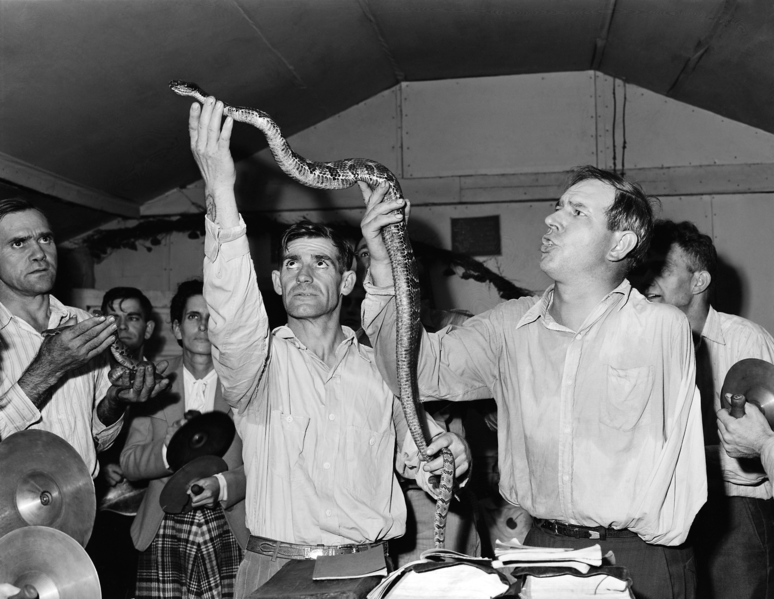A few years ago, I read a book on the practice that took a relatively sympathetic approach. Fred Brown and Jeanne MacDonald's The Serpent Handlers: Three Families and Their Faith looked at three of these congregations and the families that dominated them. Some family members had actually died of snake bites, yet their relatives were not deterred. While many people might find their faith well outside mainstream Christianity, few could doubt the sincerity of their faith, as most people tend to think that the only good snake is a dead snake.
I was flipping through the television channels a few weeks ago when I happened upon the National Geographic Channel. I rarely go above channel 48 (the History Channel), but nothing much was on this particular Tuesday night. I ran upon a show called Snake Salvation that was a sort of reality show on two serpent handling pastors. With my interest in American religion, I stayed with it--and watched additional shows on the next two or three Tuesdays.
 |
| A National Archives image of Serpent Handlers in Kentucky, 1946, via Wikimedia Commons |
The show looks at Jamie Coots and Andrew Hamblin. The former is a member of the Coots family that was included in Brown and MacDonald's The Serpent Handlers, and the latter is a protege of Coots who moved from Kentucky to Tennessee to take over a serpent handling church. The show allows the serpent handlers to tell their story in their own words and follows them around church and on their snake hunts. As of 1997, it was estimated that only 1,000-2,000 of this group existed in the United States in between 25-45 churches, although the legal issues could possibly keep some groups underground. Both of the churches depicted on "Snake Salvation" appear to have between 20 and 40 attenders at most of the church services.
Not only do the serpent handlers pick up poisonous vipers, they also take the additional parts of Mark 16 in a very literal sense. While speaking in tongues is a common, although debated, practice in American (and world) Christianity, serpent handling is not. Neither is "drinking any deadly thing." Yet, the serpent handlers also drink toxic mixtures and handle fire. In one of the latest episodes of "Snake Salvation," an overalled fellow by the name of "Big Cody" drinks strychnine and also mixes up some lye for his co-religionists. He lives to tell his story. I checked the TV schedule for the next week, and it appears that this particular show might be over. Regardless, it was somewhat enlightening as it continued the work of The Serpent Handlers and other works on this system of belief that exists on the fringe of Christianity. I must say that I'll keep watching and reading because I have no real desire to attend a serpent-handling service.